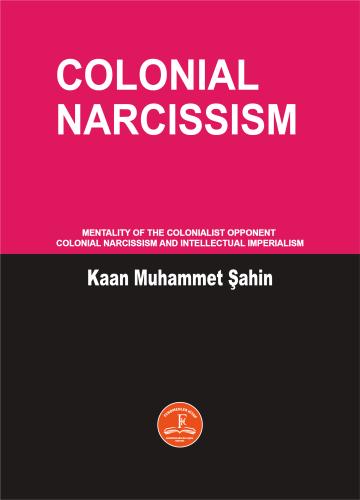
PREFACE
The aim of this study is to enhance the understanding of colonial narcissism and provide researchers in the field of intellectual imperialism with a new perspective, thereby adding a new dimension to their work.
This work is intended to contribute theoretically to scholars engaged in colonialism and post colonialism, particularly by zeroing in on Wilfred Scawen Blunt, a significant figure in Western anti-imperialist literature. One of the primary reasons for focusing on Blunt is to illustrate how imperialism nurtures intellectuals who would criticize and challenge itself.
To comprehend the privileged class engineered by colonizers in the aftermath of colonialism and the intellectuals within this class, an understanding of colonial narcissism is crucial. Understanding intellectual imperialism is also essential to grasp colonial narcissism. The focal point of this study is not the society formed after colonialism but rather understanding the colonial narcissist, the covert leading intellectual force in the formation of this society.
Friedrich August von Hayek's works extensively provide information on liberal economy, democracy, law, and education, emphasizing that those aspiring for the intellectual, pedagogical, and economic prosperity of a nation should refrain from creating privileged economic classes. However, colonialism, in order to maintain economic dominance in the withdrawn territories, must create a glamorous class within the nation that upholds its values.
The study commences by providing information on how imperialism has changed the world over time. This information is crucial to understanding how the concept of imperialism has evolved from the past to the present, as imperialism, in the course of its existence, had to adopt a more democratic approach to sustain its dominance.
A chapter of the study is dedicated to commercial companies as a tool of colonization. This section focuses on the role of commercial companies in intellectual imperialism, exploring how these companies contributed to intellectual intelligence studies.
Furthermore, another section of the study addresses the exploitation of Africa. This section concentrates on the intellectual measures taken by imperialism during the exploitation of Africa. Blunt's testimony stands out in this section, as he observed that the greatest intellectual rival of the colonizer during the exploitation of Africa was Islam, particularly within the Hanafi school.
To understand Blunt's intellectual identity, attention has been given to his political and literary personality, along with his place in imperialist literature. Subsequently, Blunt and his works are thoroughly examined, presenting the narcissistic contradictions he articulates.
While dealing with Blunt's contradictions and narcissistic personality, information is provided on his use of satire as a means to conceal his narcissism. The analysis attempts to shed light on how satire, as a useful tool for a colonial narcissistic intellectual, was employed by Blunt to silence his internal contradictions and moral qualms.
It is my hope that this study proves beneficial to all scholars studying on colonialism and imperialism, and that other researchers will fill in the gaps of my work and contribute to the ongoing dialogue.
PREFACE
The aim of this study is to enhance the understanding of colonial narcissism and provide researchers in the field of intellectual imperialism with a new perspective, thereby adding a new dimension to their work.
This work is intended to contribute theoretically to scholars engaged in colonialism and post colonialism, particularly by zeroing in on Wilfred Scawen Blunt, a significant figure in Western anti-imperialist literature. One of the primary reasons for focusing on Blunt is to illustrate how imperialism nurtures intellectuals who would criticize and challenge itself.
To comprehend the privileged class engineered by colonizers in the aftermath of colonialism and the intellectuals within this class, an understanding of colonial narcissism is crucial. Understanding intellectual imperialism is also essential to grasp colonial narcissism. The focal point of this study is not the society formed after colonialism but rather understanding the colonial narcissist, the covert leading intellectual force in the formation of this society.
Friedrich August von Hayek's works extensively provide information on liberal economy, democracy, law, and education, emphasizing that those aspiring for the intellectual, pedagogical, and economic prosperity of a nation should refrain from creating privileged economic classes. However, colonialism, in order to maintain economic dominance in the withdrawn territories, must create a glamorous class within the nation that upholds its values.
The study commences by providing information on how imperialism has changed the world over time. This information is crucial to understanding how the concept of imperialism has evolved from the past to the present, as imperialism, in the course of its existence, had to adopt a more democratic approach to sustain its dominance.
A chapter of the study is dedicated to commercial companies as a tool of colonization. This section focuses on the role of commercial companies in intellectual imperialism, exploring how these companies contributed to intellectual intelligence studies.
Furthermore, another section of the study addresses the exploitation of Africa. This section concentrates on the intellectual measures taken by imperialism during the exploitation of Africa. Blunt's testimony stands out in this section, as he observed that the greatest intellectual rival of the colonizer during the exploitation of Africa was Islam, particularly within the Hanafi school.
To understand Blunt's intellectual identity, attention has been given to his political and literary personality, along with his place in imperialist literature. Subsequently, Blunt and his works are thoroughly examined, presenting the narcissistic contradictions he articulates.
While dealing with Blunt's contradictions and narcissistic personality, information is provided on his use of satire as a means to conceal his narcissism. The analysis attempts to shed light on how satire, as a useful tool for a colonial narcissistic intellectual, was employed by Blunt to silence his internal contradictions and moral qualms.
It is my hope that this study proves beneficial to all scholars studying on colonialism and imperialism, and that other researchers will fill in the gaps of my work and contribute to the ongoing dialogue.
| Taksit Sayısı | Taksit tutarı | Genel Toplam |
|---|---|---|
| Tek Çekim | 270,00 | 270,00 |











